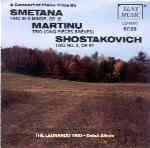The Leonardo Trio plays all of this music with great precision, superb ensemble balance, and idiomatic flair. They make a particularly strong impression where the music needs a little help concealing its formal seams, as in the first movement of the Smetana Trio. The Five Short Pieces that comprise the Martinu Trio exude liveliness and sunny charm, and the only weakness occurs in the last movement of the Shostakovich, which, though played with impressive clarity and care, fails to build to the type of shattering climax that, say, the Borodin Trio manages so impressively on its Chandos recording. Otherwise, from the opening harmonics through the grave passacaglia, this is a very beautiful performance, and once the last-movement hysterics are over the ending has both atmosphere and quiet poetry. The group also benefits from an impressively well balanced recording, with each instrument ideally placed in a realistic acoustic space. In sum, this is an unusual coupling of Eastern European music for piano trio, and if you appreciate these works, you’ll enjoy these performances too.
































